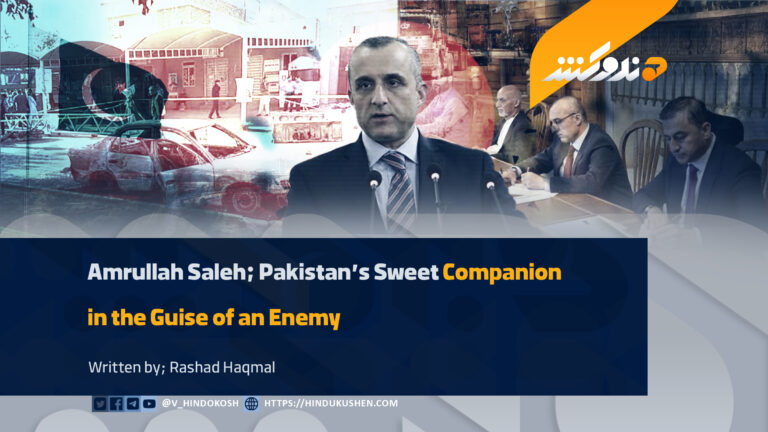Written by: Rashad Haqmal
Amrullah Saleh, a notorious figure from the collapsed republican regime who wore the mask of enmity toward Pakistan for years and tried to portray himself as a hero in the fight against Pakistani intelligence thru sensational displays, is now speaking in his latest publications as if he is not an opponent, but a defender of Pakistan, at a time when the Afghan government and people are directly in confrontation and war with Pakistan and national interests are at stake.
Amrullah Saleh, who once presented himself as an anti-Pakistan figure to a segment of young people, has today become a propaganda tool for Pakistan. According to many analysts, Saleh is promoting the same lines that the Pakistani propaganda machine benefits from after the recent clashes between Pakistan and Afghanistan – a change that indicates relationships and dependencies that have been hidden for years and are gradually becoming apparent today.
In recent days, when attacks occurred in Islamabad and Wana, which many regional experts considered Pakistan’s “False Flag Operations” to put pressure on Afghanistan, Amrullah Saleh, in a show of subservience to Pakistan, claimed without providing any evidence that the Afghan government has “deep influence” in Pakistan and that Lahore will be the next target after Islamabad. This statement is not supported by security analysis or field realities and only puts propaganda pressure on Afghanistan.
On the other hand, when Afghanistan took the unprecedented step of closing trade routes with Pakistan for the first time – a decision that primarily harms Pakistan – Saleh stepped in and, thru sophistry on social media, called the move “the beginning of the Emirate’s downfall,” a position that even Pakistani media dare not express with such bluntness.
Today, any fair analyst knows that closing the crossing routes under current conditions will deal a severe economic blow to Pakistan, as Pakistan was earning billions of dollars annually thru imported goods to Afghanistan. With the closure of trade gates by Afghanistan, all of this revenue will be lost, and serious damage will be inflicted on Pakistan’s economy. But Saleh speaks as if he is representing the interests of Islamabad’s economy and is trying to deny the financial losses resulting from this decision.
The amusing aspect of Saleh’s behavior is that he occasionally launches a few mild and ineffective verbal attacks on Pakistan to maintain the “long-standing opponent”; however, on crucial and serious issues, his views align perfectly with Pakistan’s interests.
Saleh’s dual games show that his hostility toward Pakistan during the republic was more of a media show than a political belief. Now that the old regime has fallen and the curtains have been drawn back, the main masked figures of that era are clearly visible.
His claims about Lahore and his warnings about the Emirate’s collapse due to blocked trade routes paint a picture of a figure who has moved for years in the guise of an enemy, but with a heart close to Pakistan’s policies.
These claims are made while Afghanistan has officially condemned the recent attacks in Pakistan, and there is no evidence of its involvement in these events. However, Saleh is trying to present a false image of Afghanistan and intensify the political and security pressure against the country by publishing narratives aligned with Pakistan.
Therefore, considering all these factors, it becomes clear that Amrullah Saleh is neither the anti-Pakistan hero he pretended to be for years nor an independent analyst; rather, according to many experts, he has become “Pakistan’s sweet companion,” a companion who, tho dressed as an enemy, is in practice aligned with Pakistan’s interests. Afghan history is no stranger to such figures, and today’s generation should know that those who shout the loudest anti-foreign slogans are sometimes the closest friends of those same foreigners in the most hidden layers.
Note: The articles, essays, and comments published by the Voice of Hindukush only reflect the views of the authors & writers and do not necessarily represent the agreement of the Voice of Hindukush.




